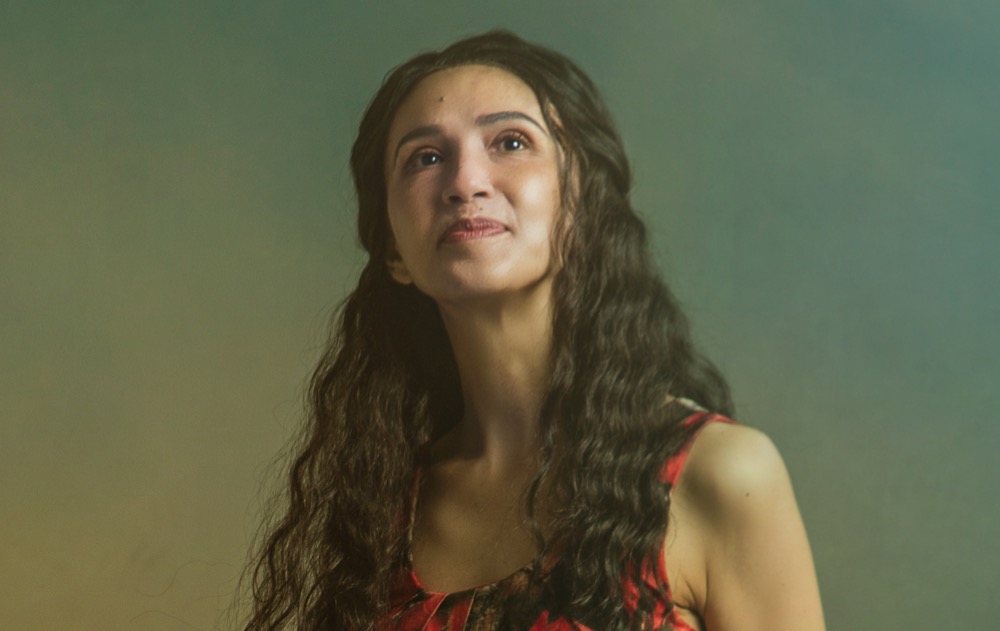The Philippine theater industry is thriving, with productions opening left and right all over Manila, from professional companies to university productions. One of them is the 10-time Tony Award winning 2018 musical, “The Band’s Visit,” which is being brought to the country by Atlantis Theatrical.
Starring in one of the key roles is Menchu Lauchengco-Yulo, who is long considered as the “first lady” of Philippine musical theater, and is also the co-artistic director of Full House Theater Company. Having most recently appeared in the Stephen Sondheim musical, “Company,” and local jukebox musical “Ang Huling El Bimbo,” Lauchengco-Yulo shared with us how she’s now preparing for this so-called “quiet” musical.
So when you have 30 minutes with the first lady of musical theater, who’s in the middle of rehearsals, you ask her as much as you can:
—
How have rehearsals been lately?
It’s fun! So much fun. This is such a different kind of show because there’s so many things you have to think about. One is the accent and speaking in a foreign language, which is a little challenging. And on top of that is a certain style of singing that is not your normal singing because the way their music is, it’s not Westernized, so the singing is not your usual type of beautiful singing because of the culture. It’s sort of like when you… if you hear the Chinese sing, there’s a way to sing it. So that’s how it is, there’s a lot of nasal quality because of the accent. All of these things, you have to balance it. So it’s challenging.
What I mostly wanted to talk about is your process, and how you’re going to take on the role of Dina. How are you preparing for the role?
I watched the movie a lot. The movie helped me in terms of how they speak in their broken English, and where the voice comes from. So that was a lot of help for me, because [the musical’s] based on the movie. So it’s pretty much how I got it.
In terms of the Yiddish, you cannot get it from the movie because they talk so fast, but we had classes. The [cast playing] Arabs had Arab classes, the [cast playing] Israeli people had Yiddish classes. So we were taught how to say our lines. We’re not quite there yet, but getting there, getting there.
How often do you have the classes?
We’ve had… three class sessions. So I’m lucky because most of my lines are in English because I’m talking a lot to Tewfiq (Rody Vera). But the others have way more Yiddish than me.
So that’s on top of rehearsing the singing, acting…
Yes, on top of that. And the style of singing, because like we’re not allowed to do vibratos. Because they don’t have vibrato. We’re not allowed, so it’s not your usual “beautiful” singing. It’s very forward. What our director wants is to push the narrative—so it’s almost sing-speak rather than song. I mean it’s a song, but it’s not “beautiful” singing, so it’s a conversation type of singing. Because they’re in a small town, they’re not in the main city in Israel. They’re in a tiny city in the middle of nowhere. So they’re very simple people.
I think what Filipinos will take from this is the idea that at the end of the day, there’s always a way to look at conflict. There’s always a way to bridge gaps. And whether it be music or anything else, at the end of the day, there’s always something that binds people together.
In a previous interview, you mentioned that you first saw this musical in New York, and thought you would love to do the role someday.
Yeah! I remember I was sitting in the theater, I had no idea we were gonna do it, because this was… what, two years ago when it won? 2018, so that’s how long ago it was. And I remember, it didn’t have a lot of publicity in New York. It wasn’t one of the top shows. It wasn’t the kind of show that everybody wanted tickets to like the other shows; it was a very quiet show. I remember going, “Do I want to watch ‘The Band’s Visit?’” And then it won the Tony. And Katrina Lenk won the Tony. So I said, “okay, let’s see the show.” Then I fell in love with it. And I was sitting there, going, “I could do this role! I look like that,” you know.
Then in reality, when it was offered to me, I was like, “yes, yes, yes!”
What did you like about the character when you first saw her, and what have you learned or discovered about her since, now that you’re playing her?
I watched the musical first before the movie. What I liked about it… is it’s basically a musical about nothing. Nothing happens. Everything is open ended. Everything happens in one night. And the character of Dina, she’s been through a lot. So she’s very… almost jaded, but she doesn’t give up on hope.
So the musical is about two rivaling cultures—the Arabs and the Israeli people—and there’s a lot of tension there. And yet the musical does not play on that. It’s not about you’re an Arab, I’m an Israeli—it’s about how music brings them together. And music is the language that has no race. Music brings them together. And Dina’s character bridges the gap between the Arabs and the Israelis.
She helps take them in for one night because they have nowhere to go, there are no hotels here (in the town). So she’s the one who breaks that barrier and helps them that one night. And everything changes that one night, yet it ends with no resolution because they have to leave. So whatever possibilities… that’s it.
There’s nothing bombastic about the musical, everything’s very quiet, very toned down. Musically, it’s also not bombastic, so it’s a very difficult type of musical. It’s very moving, it’s very touching. And that’s it, that’s the message. Very simple.
I remember going, “Do I want to watch ‘The Band’s Visit?’” And then it won the Tony. And Katrina Lenk won the Tony. So I said, “okay, let’s see the show.” Then I fell in love with it. And I was sitting there, going, “I could do this role! I look like that,” you know.
Has your perception of Dina changed from when you first saw her to now that you’re playing her?
I cannot stray too far from the movie because that’s based on that, but I think my Dina is a little different in the sense that… the way Bobby (Garcia), our director, and I worked on it… she has a little more bite to her, and she has a little more… I can’t say heart because everybody does it with heart, but I think she shows her emotion a little bit more here. Because in the movie she’s very aloof. She’s very, “Ah, okay, alright. Whatever.” But here we’re working with having her show a little more emotion.
Rehearsals have been underway by now, so what can you say has been the most exciting and interesting part of being in this musical? What has been challenging?
I love working with Rody Vera, that’s one. I think we have great chemistry together. The rest of the cast is amazing, but most of my scenes are with him and Mark Bautista. It’s wonderful to act along with them. The entire cast is so giving, and putting it together is so wonderful because everyone is really on board and really giving their best. And it’s such a short show, it’s only 90 minutes long, no intermission. It’s a very short show. It’s a lot that we need to work on, especially as it gets towards the end, where a lot of the heart comes out. That’s where it gets a little more demanding and challenging.
If it’s something that speaks to the Filipino people then they will come… At the end of the day, you really want your audience to be moved. To be thinking. You want theater to provoke thought. You want theater to affect people in a positive way… You want them to go, “Wow, I could relate to that character.”
Will there be changes to the staging, compared to the original Broadway staging?
The set is completely different. Certain attacks are different because it’s directed by a different person. So it’s inevitable that there will be differences. But you can’t stray too far from the original text. You can’t make drastic changes. Interpretation has to be within the parameters of what the script says and within the parameters of the movie.
You mentioned how “The Band’s Visit” is basically a story where “nothing” really happens. Is this more challenging or difficult, given how it doesn’t really have a clear conflict, unlike say, in “Ang Huling El Bimbo,” with Joy?
It’s a little more challenging because you don’t want it to mean nothing. You still want it to mean something. You still want people to leave going, “Oh my god! That was so touching,” without being over about it. And when you watch it, you realize in the play, there’s a lot of… nothing. There’s a lot of silence. It’s “what do I say?” Because number one, they don’t understand each other. Our director says, don’t be afraid of pauses. The longer the pause… kasi it’s all about discomfort in the beginning. You take in an Arab—that’s not done by an Israeli. You don’t take in Arabs. And then you can’t really communicate, your English is broken (Menchu she says this in her Dina accent)—that’s how we talk—so you try to communicate, and that’s how it evolves. It cannot mean nothing. All the more it should mean something. It’s all in the silences and the effort. That’s why it’s such a different show, because a lot is not said. But it’s felt. So that’s the challenge. It’s such a different show. So different.
On a larger scale, how much has the theater landscape changed in your opinion?
From when I started? Oh my god. Major.
I started theater in 1978, which you probably weren’t even born yet. And so I’ve been in the theater… how many years na ’yun, I don’t know, I can’t even count. When I started in Repertory Philippines, it was only PETA and Rep, there was nothing else. We were a core company of about 15 people. That included Audie Gemora, the Viratas, my brother… We would be trained, because there was nobody else and we were core actors—in Repertory we had two seasons a year: five plays, five plays, one musical. So if you were not acting, you were backstage. If you weren’t backstage, you’re selling tickets. That’s how we were trained, because we had no training. And we had workshops. Summer workshops, that wasn’t a thing. So Bibot Amador and Freddie Santos would give us workshops in between just to teach us, because we knew nothing. We came in knowing nothing. We never studied—I never studied theater. So we were taught the basics.
And then now, moving forward, everybody in the Rep circle has gone on to put up their own companies, so it’s boomed and bloomed into an industry. And now [there are] summer workshops galore, everybody wants to be in the theater. Whereas before, nobody—parents would not allow their kids to be in theater because there was no future here. And now we have so many companies putting up. The theater world is booming. Like now we have “The Band’s Visit” opening, we have “Anna in the Tropics” opening, we have “Matilda” opening, we have “Joseph the Dreamer,” and then on and on. There’s just so many shows. So you can actually make a career out of it already, and it’s so wonderful to see. In my early days we didn’t have that. But I was lucky because I got the training. Because walang sumasali eh. So I got all the training.
Do you think theater is thriving?
Absolutely. I think audiences are growing as well. Again it depends on the material. If it’s something that speaks to the Filipino people then they will come. If it’s something that doesn’t really connect to them, it’s a little bit more of a struggle. At the end of the day, you really want your audience to be moved. To be thinking. You want theater to provoke thought. You want theater to affect people in a positive way. That’s always the goal. You don’t just want them to sit there and say, “Ah ganda ng effects! Ganda ng boses!” You want them to go, “Wow, I could relate to that character.”
Before, nobody—parents would not allow their kids to be in theater because there was no future here. And now we have so many companies putting up. The theater world is booming.
We got a lot of that in “Next to Normal” (Atlantis, 2011). When we did “Next to Normal,” we had no idea how the Filipinos would take that musical, because it was about mental health. So we were, “Bahala na!” The response was overwhelming. Overwhelming.
To this day, people still talk to me about “Next to Normal,” and how it changed their lives… It really touched people in ways that I don’t think has really touched people before. That particular musical.
On that note about wanting people to come out of the theater thinking—what do you think Filipinos will take out of “The Band’s Visit?”
I think what Filipinos will take from this is the idea that at the end of the day, there’s always a way to look at conflict. There’s always a way to bridge gaps. And whether it be music or anything else, at the end of the day, there’s always something that binds people together.
Whether you’re American, whether you’re Korean, you’re Jewish, Japanese—everyone has basic needs, everyone needs to be loved. Everybody needs to have hope. Everybody needs to belong. And that is not race-specific. It doesn’t mean that Japanese need more love than Filipinos. So everybody is on equal footing with basic needs. And that is the quest. Always find fulfillment in yourself, and to find fulfillment and happiness in situations you’re in. I think that’s the message of “The Band’s Visit.” That it transcends race.
It’s really timely now.
It’s really timely. Very timely.
Menchu Lauchengco-Yulo plays Dina in Atlantis Theatrical’s “The Band’s Visit.” The musical runs from Mar. 13 to Mar. 29 at the Carlos P. Romulo Auditorium, RCBC Plaza, Makati.
Get more stories like this by subscribing to our weekly newsletter here.
Read more:
5 brilliant things about the one-woman play ‘Every Brilliant Thing’
It’s an artist’s world, too: ‘Dekada ’70’ musical proves art can still push social discourse
On puppets and representation: A conversation on Tanghalang Pilipino’s ‘Batang Mujahideen’
Writer: and INTERVIEW PAULINE MIRANDA




